The Downfall of Muslims and The Solutions | Imam Muhammad Nasir al-Din al-Albani
The Downfall of Muslims and The Solutions | Imam Muhammad Nasir al-Din al-Albani
Publisher:
Dar As Sunnah Publications
Author:
Imam Muhammad Nasir al-Din al-Albani
Language:
English
Binding:
Soft Cover
Pages: 80
Size: A5 |5.8 x 8.3 in| 14.8x 21 cm
Couldn't load pickup availability
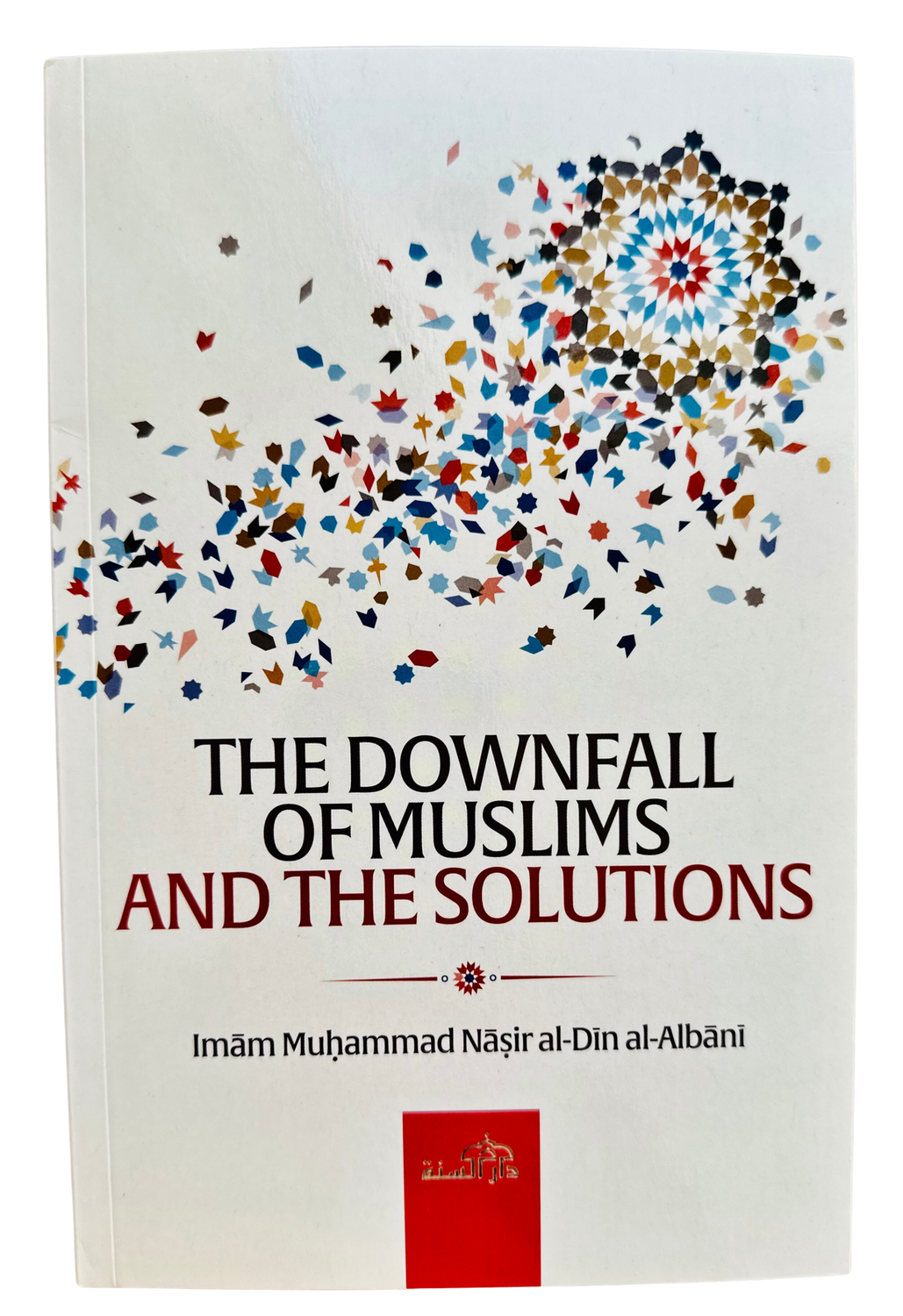
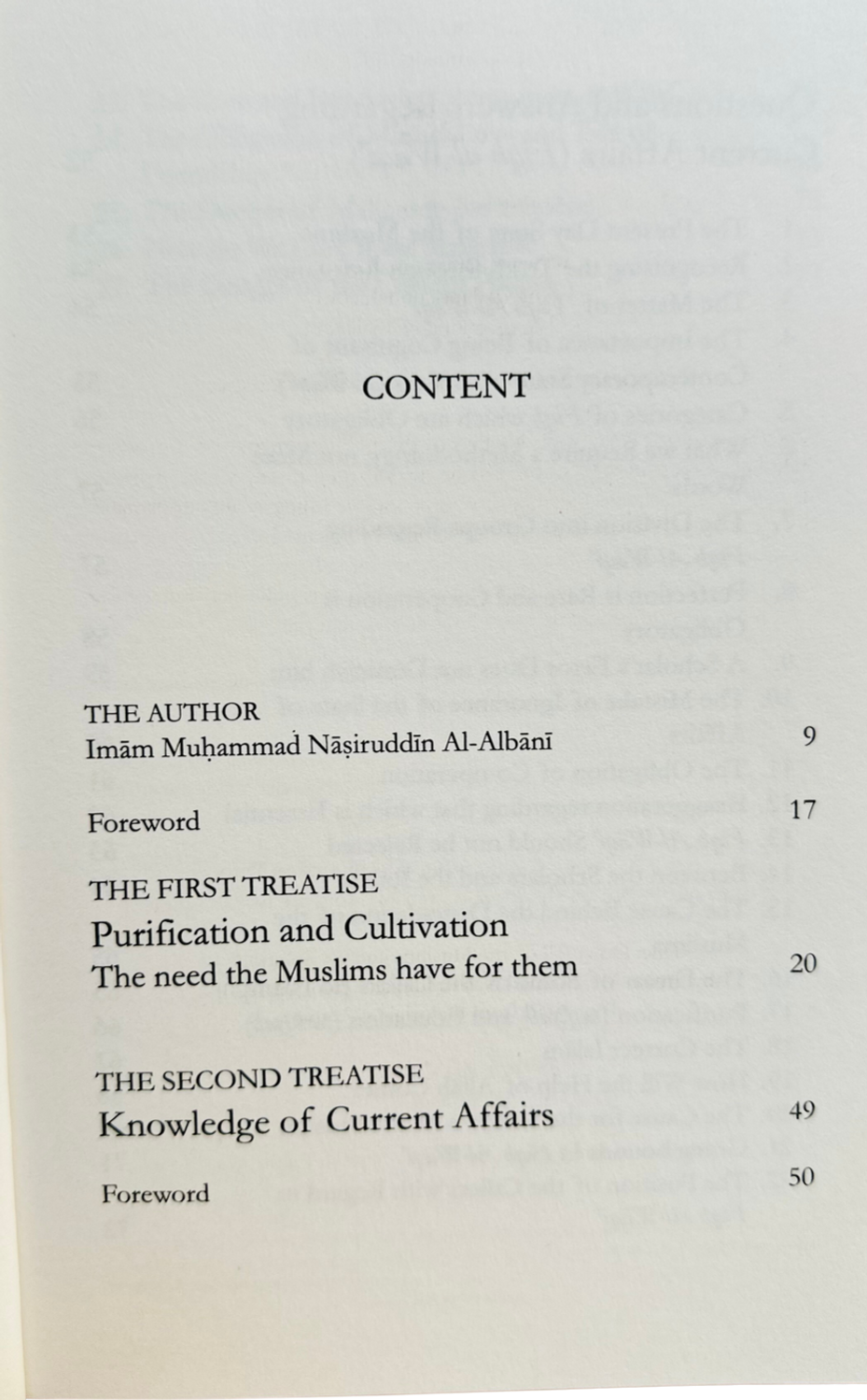
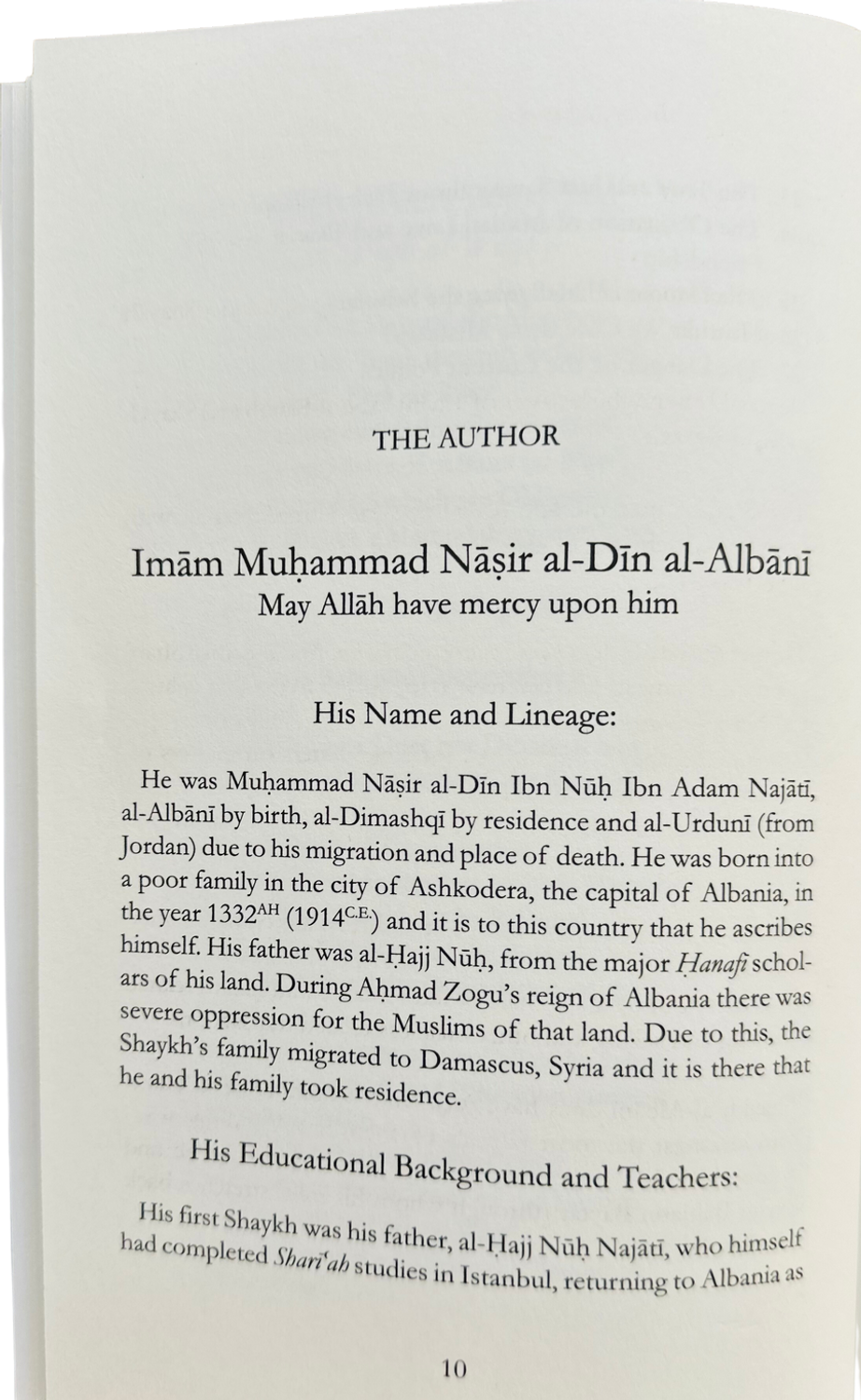
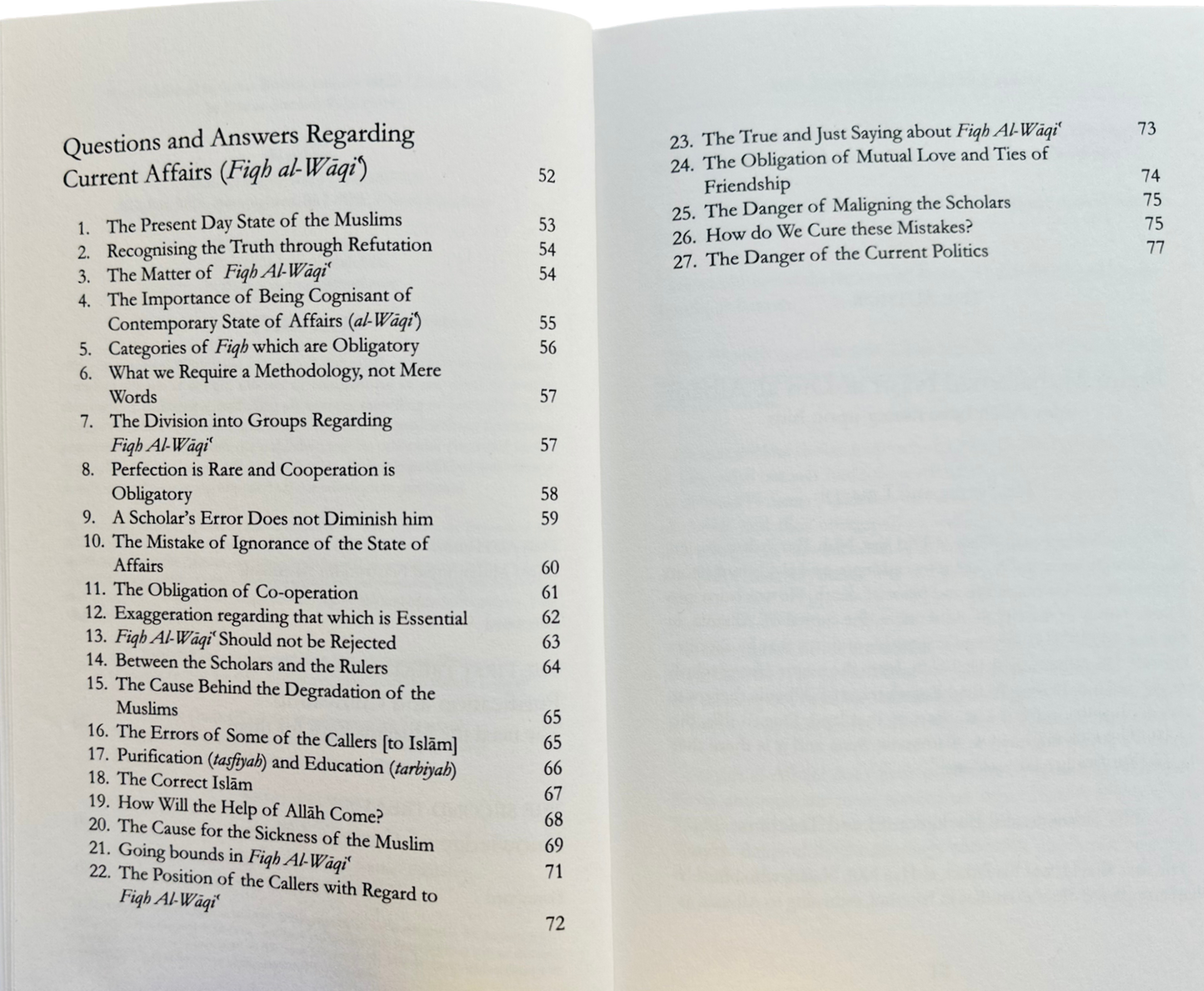
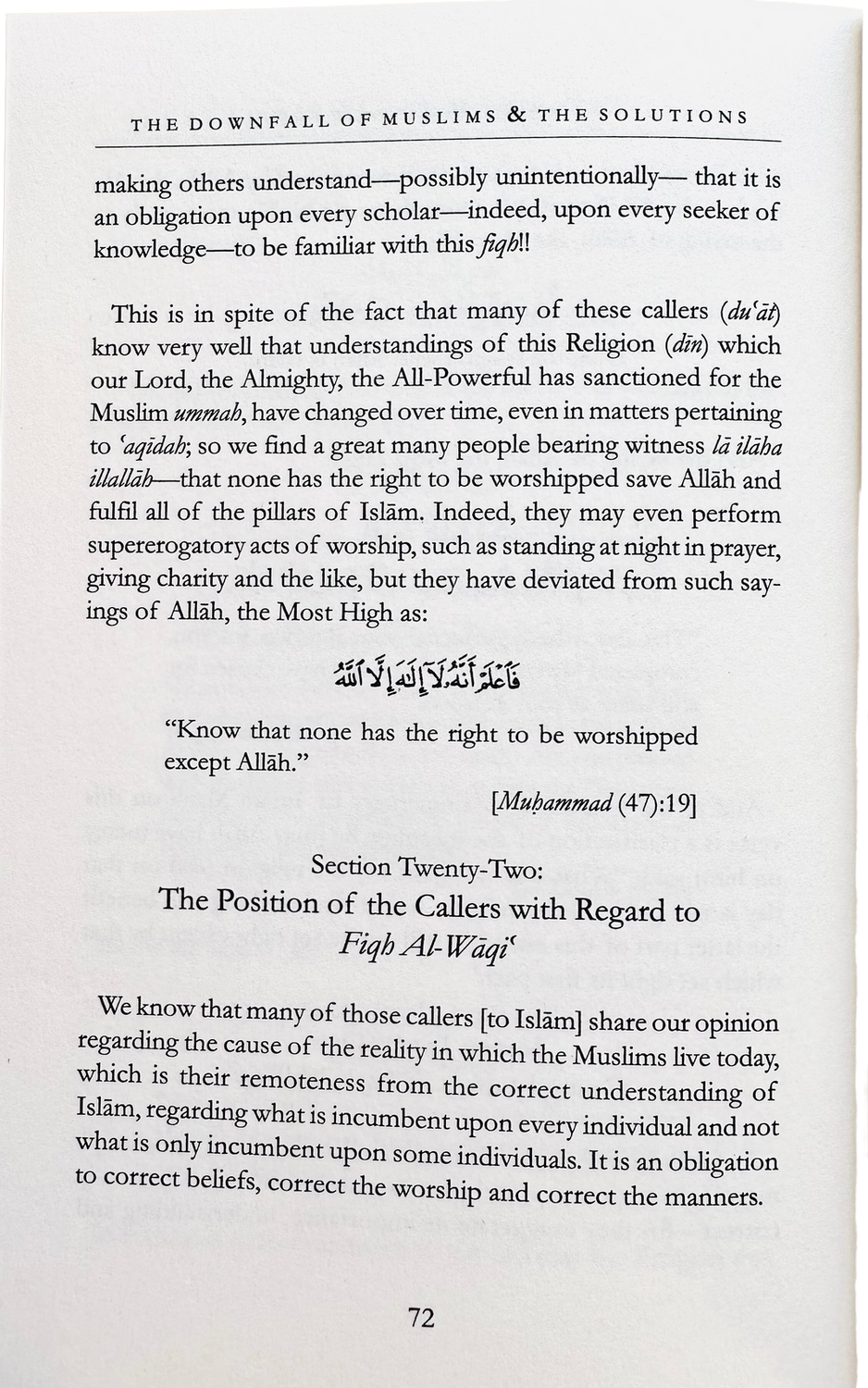
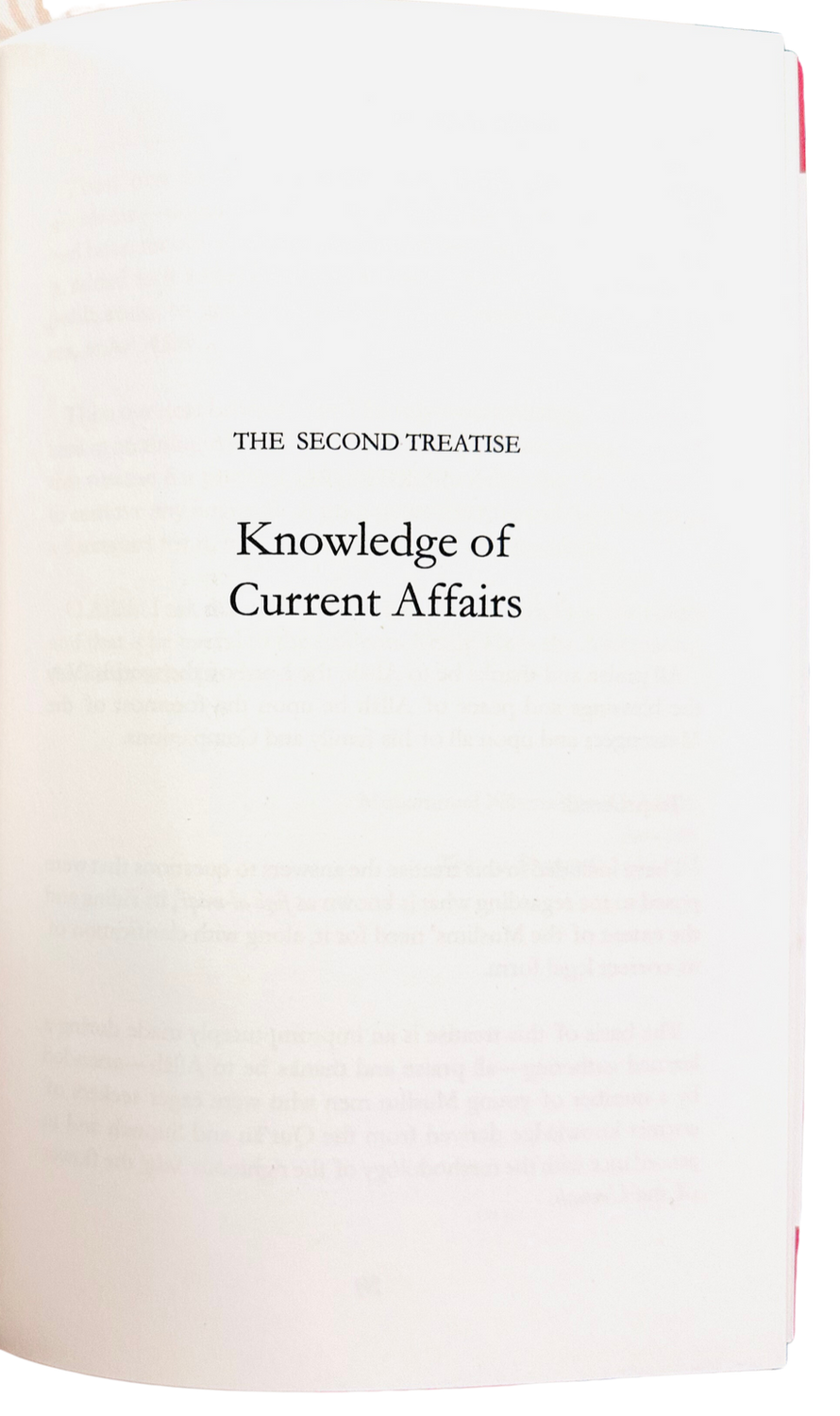
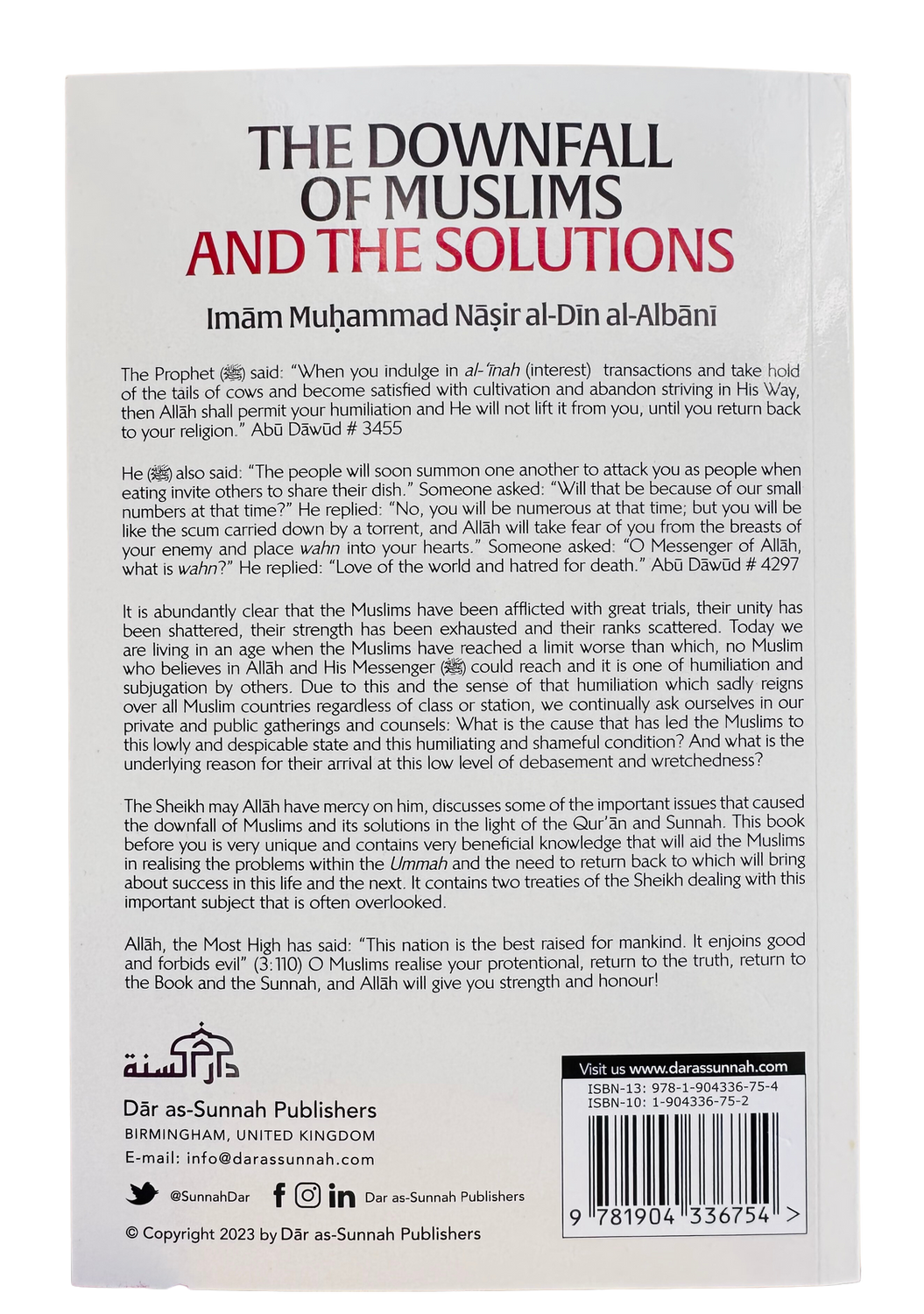
Collapsible content
Description of Book
The book "The Downfall of Muslims and The Solutions" addresses the issues that have led to the current state of Muslims, including shattered unity, depleted strength, and scattered ranks. Through referencing the Qur'an and Sunnah, the author offers insightful solutions to overcome these challenges and regain strength and honor. This unique and informative book is a valuable resource for Muslims seeking to understand and resolve the problems within the Ummah. Remember, Allah has stated in the Qur'an, "This nation is the best raised for mankind. It enjoins good and forbids evil" (3:110). Let us return to the truth and the teachings of the Book and the Sunnah, and Allah will grant us strength and honor.
Publisher
Dar As Sunnah Publications
Author
- Imam Muhammad Nasir al-Din al-Albani
Sample Pages - Content
Page : 01
THE DOWNFALL OF MUSLIMS
AND THE SOLUTIONS
Imām Muḥammad Nasir al-Din al-Albāni
Page : 02
THE AUTHOR
Imam Muhammad Nasir al-Din al-Albānī May Allah have mercy upon him
His Name and Lineage:
He was Muḥammad Nasir al-Din Ibn Nuḥ Ibn Adam Najātī, al-Albānī by birth, al-Dimashqi by residence and al-Urduni (from Jordan) due to his migration and place of death. He was born into a poor family in the city of Ashkodera, the capital of Albania, in the year 1332AH (1914C.E.) and it is to this country that he ascribes himself. His father was al-Hajj Nuh, from the major Hanafi schol- ars of his land. During Ahmad Zogu's reign of Albania there was severe oppression for the Muslims of that land. Due to this, the Shaykh's family migrated to Damascus, Syria and it is there that he and his family took residence.
His Educational Background and Teachers:
His first Shaykh was his father, al-Hajj Nuh Najati, who himself had completed Shari'ah studies in Istanbul, returning to Albania
Page : 03
Chapter One The Prayer
1. 'Umar Ibn al-Khaṭṭāb (radiyAllāhu 'anhu) reported that he heard the Messenger of Allah (*) saying:
إنما الأعمال بالنيات وإنما لِكُلِّ امرى: ما نوى
Chapter One: The Prayer
The five daily prayers and one Jumu'ah to the next Jumu'ah serve as an expiation [for the sins] commit- ted between them so long as the major sins are not perpetrated.
One wording has,
رمضان إلى رمضان
...one Ramaḍān to the next Ramadan.
Reported by Muslim. 2,3
3. Ma'dan Ibn Abu Talḥah said: 'I met Thawban, the servant of the Messenger of Allah (), so I asked him, "inform me of an action that I can perform that would cause Allah to enter me into Paradise", or [I asked], "the most beloved action to Allah, the Exalted." He remained silent, so I asked him again but again he remained silent. Then I asked him a third time and he replied: "I put the [same question] to the Messenger of Allah () and he replied:
Indeed actions are by intentions and every person shall
have what he intended.
The hadith is agreed upon.'
2. Abu Hurayrah (radiyAllahu 'anhu) reported that the Messenger of Allah() said:
الصلوات الخمس والجُمُعَةُ إلى الجُمُعَةِ كفارات لما
بينهن ما لم تُغْشَ الكبائر».
عليك بكثرة السجود الله تعالى فإنك لا تسجد
الله عز وجل سجدة إلا رَفَعَكَ الله عز وجل بها درجةً وحط عنك بها خطيئة.
2 <<T>> Ibn 'Umar once entered the Masjid and saw a people praying and remarked, 'O People! Rejoice, for not one of you will be from the party of the Fire.' Then he recited, «[Asking them], 'what put you into the torment?' They will say, 'we were not of those who prayed'> [al-Muddaththir (74): 42-43]-al-Baghawi, Sharb al-Sunnah [2/174].
> <<T>> Al-Nawawi said: 'meaning that all sins will be forgiven except for the major sins, they will not be forgiven. This is because sins are forgiven with the condition that they not be major [which must be repented from]. All of the above mentioned matters are able to expiate the [minor] sins. If a person does not have any minor sins, good deeds will be written on his behalf and his ranking [in Paradise] will be raised.' «T» Al-Hafiz al-Munawi, Fayd al-Qadir
Page : 04
THE WAY OF THE WORSHIPPER
Then he said: "fasting three days of every month and one Ramadan to the next Ramadan is like fasting the whole year."
Then he was asked about fasting the Day of 'Ashura' upon which he replied: "it expiates [the sins] of the
year."
Reported by Muslim alone.
14. Mu'adhah (radi Allahu 'anha) reported that she asked 'A'ishah (radi Allahu 'anha), the wife of the Prophet (), 'did the Mes- senger of Allah () use to fast three days of every month?' She replied: 'yes,' so I asked her, 'which part of the month did he fast in?' She replied:
'he was not concerned as to which part of the month
he fasted in.'
Reported by Muslim alone.
The hadith of Abu Hurayrah (radiy Allahu 'anhu),
'my close friend enjoined me to three things: to fast three days of every month...'
has preceded in the section dealing with al-Duḥā and it is agreed upon. The same applies to the hadith of Abu'l-Darda' (radiyAllāhu anhu) concerning this fast and it is reported by Muslim alone.
Chapter Three Charity
1. Abu Hurayrah (radiy Allahu 'anhu) reported that the Messenger of Allah () said:
There is no day in which the servants awake ex- cept that two Angels descend, one of whom says, 'O Allah, give the one who spends in charity, an abundant replacement' and the other says, 'O Allah, give the one who refrains from spending in charity, destruction.'
Agreed upon.
2. Abu Hurayrah (radiy Allahu 'anhu) reported that the Messenger of Allah () said:
None of you gives even a date in charity from lawfully attained wealth except that Allah takes it with His Right Hand and nurtures and cultivates it in the same way that one of you nurtures his foal or young camel until
Page : 05
Chapter Four
Supplication and Remembrance
Chapter Four: Supplication and Remembrance i. What to Say when Arising after having been Asleep
2. Ibn 'Abbas (radiy Allahu 'anhuma) reported that when the Prophet() stood at night in order to pray Tahajjud he used
to say:
1. Nu'man Ibn Bashir (radiy Allahu 'anhu) reported that the Prophet (*) said:
Then he recited:
"Supplication is worship."
وَقَالَ رَبُّكُمُ ادْعُونِي أَسْتَجِبْ لَكُن
إِنَّ الَّذِينَ يَسْتَكْبِرُونَ عَنْ عِبَادَتِي سَيَدْخُلُونَ جَهَنَّمَ
داخرين و
<<And your Lord says, 'call upon Me, I will respond to you'. Indeed those who disdain My worship will enter Hell abject>
[Ghafir (40): 60]
Reported Abu Dawud, at-Tirmidhi and Ibn Majah.1,2
Many people quote the hadith with the wording, "supplication is the essence of worship," reported by at-Tirmidhi [no. 3431]. However it is da'if due to the 'an'anah of al-Walid Ibn Muslim and the weak memory of ibn Lahi'ah.
2 «T» Ibn al-Qayyim, ad-Da'u wa'l-Dawa' [pp. 13+] mentions the causes that lead to the supplication being answered in a beautiful way, saying: 'when the servant combines in his supplication presence of the heart and its being attentive and devoting itself solely to Allah, sincerely asking Him for the desired matter, doing so at one of the six times when the supplication is more likely to answered-these being.
The last third of the night.
At the time of the adhan.
Between the adhan and iqamah.
At the ends of the prescribed prayers.
From the time the Imam ascends the pulpit to the time the prayer has finished on the day of Jumu'ah.
The last hour after the prayer 'Aşr.
Alongside this the servant appends to this fear and reverence in the heart, beseeching his Lord in a state of humility and submissiveness. He faces the Qiblab and is in a state of purity, he raises his hands to Allah and begins by praising and extolling Him, then he invokes peace and blessings upon Muhammad, His servant and Messenger (). He precedes mentioning his need by seeking forgiveness from Allah and then he earnestly and sincerely makes his request as one who is needy and impoverished, supplicating to Him out of hope and fear. He seeks the means of getting close to Him by mentioning His Names and Attributes and making the religion sincerely for Him Alone. Before making supplication he gives in charity. If all this is done then this supplication will never be rejected especially if the servant employs the supplications that the Messenger of Allah() informed us would be accepted or if his supplication includes mention of Allah's Greatest Name.
Page : 06
The Way of the
Worshipper
Al-Hafiz Al-Mundhiri (d. 656H)
Allah, the Most High, Says: "So whoever hopes for the meeting with his Lord- let him do righteous actions and not associate anyone in the worship of his Lord." Al-Khaf (18):110
Connecting to Allah in worship is fundamental to the life of the believer. Through worship does a believer attain the love of Allah, inner strength to fight the devil and cleanse the soul. Worship is not just a mere act or some movement of the limbs, but rather it is an act of devotion to your Lord. Only the true servant of Allah will remain devoted to His worship, despite the difficulties, trials, and tribulations of life - worship is a means of escape from these problems. In this short and materialistic world connecting to the Creator and reflecting upon His greatness is surely the way to enlighten the soul and nourish it for the abode of permanent residence - the hereafter.
The true servant knows that being devoted to Allah, is a means of salvation in this life and the next. It is also a path to the pleasure of the Most Merciful. Through devotion to Allah will you find strength, peace, tranquillity, hope and a real purpose of your existence. It is the way to real success, only travelled by those who are sincerely devoted and humble. Our Prophet() was the best worshipper of Allah, he was truly devoted and humble before Allah, the Almighty. In turn he taught his Companions the best acts of worship, the need to have sincerity in everything that a believer does, to be a true devotee to Allāh and to the Sunnah of the Prophet. This was also emulated by our pious predecessors.
Before you is a text penned over eight hundred years ago by the hadith master al-Hafiz al- Mundhiri, may Allah have mercy upon him. He wrote this at the request of a close friend, for all those who would like to dedicate their life to the servitude of the One true Lord. This tremendous work will provide you with life-changing benefits to worship. If you desire to please Allah, to revive your Iman and to do away with heedlessness then you must start with this very beneficial text!
Där as-Sunnah Publishers
BIRMINGHAM, UNITED KINGDOM E-mail: info@darassunnah.com
@Sunnah Dar fin Dar as-Sunnah Publishers
Copyright 2022 by Där as-Sunnah Publishers
Visit us www.darassunnah.com ISBN-13: 978-0-9536476-8-2 ISBN-10: 0-9536476-8-4
9780953647682">
Who is Imam Muhammad Nasir al-Din al-Albani?
Imam Muhammad Nasir al-Din al-Albani (1914–1999 CE) was a prominent Islamic scholar and hadith specialist from Albania, known for his contributions to the science of hadith authentication. Self-taught in hadith methodology, he became widely respected for his rigorous approach to verifying the authenticity of hadiths. Al-Albani’s major works include Silsilat al-Ahadith as-Sahihah (The Series of Authentic Hadiths) and Silsilat al-Ahadith ad-Da'ifah (The Series of Weak Hadiths), both of which classify and evaluate hadiths. His emphasis on returning to the Quran and authentic Sunnah influenced contemporary Salafi thought, making him a significant figure in modern Islamic scholarship.







